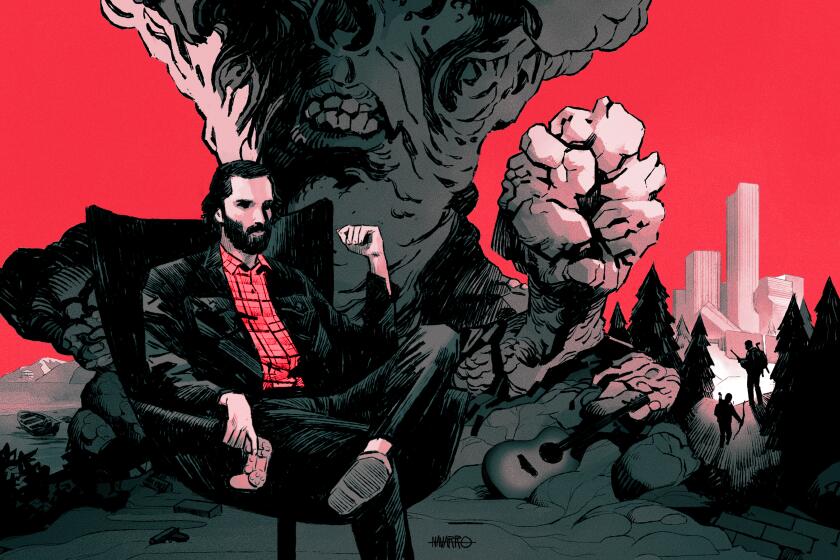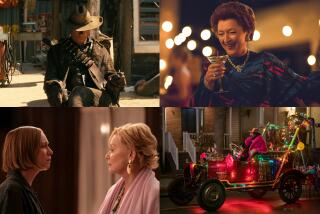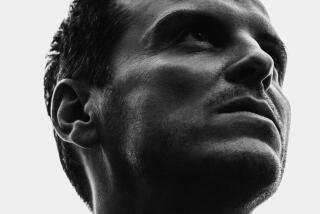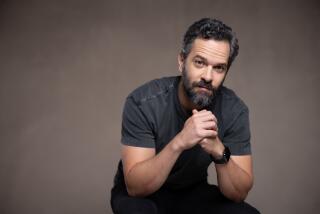How in just a few scenes, that special ‘Last of Us’ episode created a love for the ages
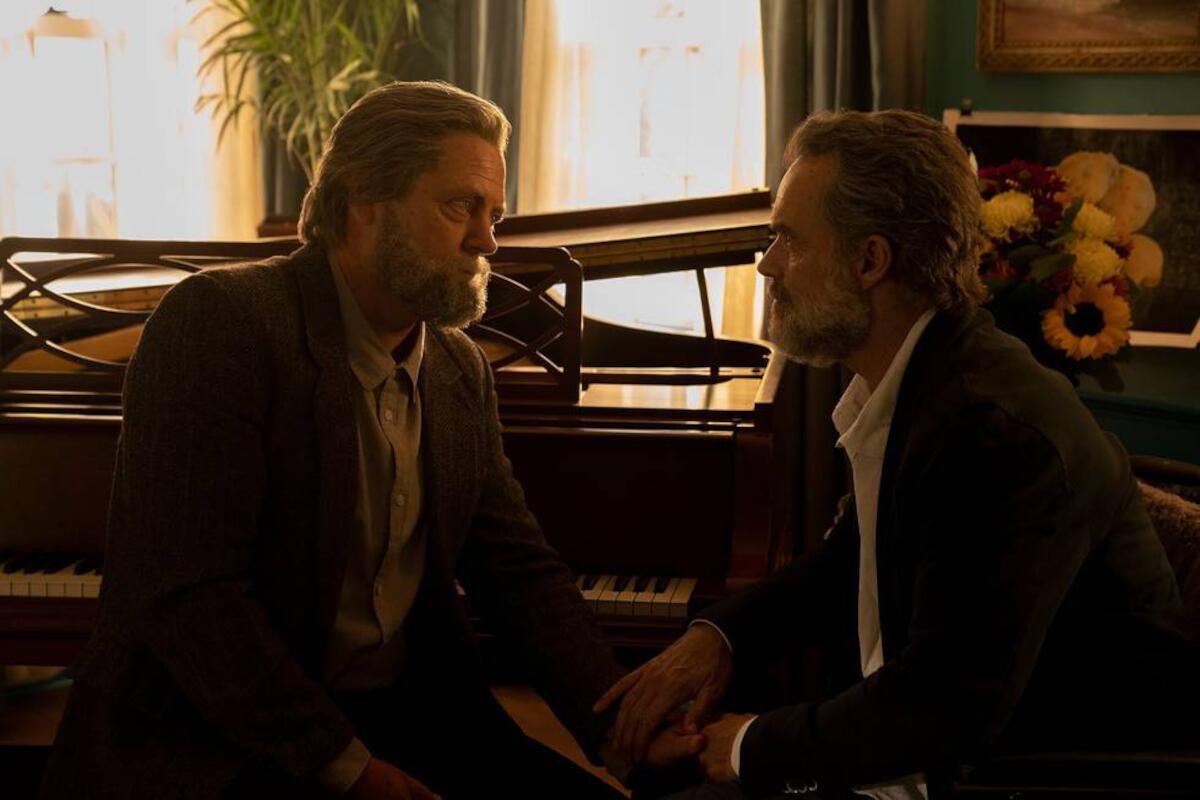
- Share via
Like millions around the world, Peter Hoar played “The Last of Us,” the absorbing video game, co-created and written by Neil Druckmann, that chronicled the journey of Joel, a survivor of a devastating plague that wiped out much of the planet’s population, and Ellie, a young woman who might hold the key to a cure. And like so many other gamers, as part of that journey he encountered Bill, a surly loner who Joel teams up with along the way. In the game, Bill mentions a “partner” named Frank, who has hanged himself. It’s a passing reference to their hidden love affair, but Hoar confesses he never gave it a second thought.
“I was too terrified to think too much about the details,” the director of the acclaimed 2021 British miniseries “It’s a Sin” admits. “I just loved the game. It took me about three goes to play it, because it was traumatizing, which sounds odd for something you say you love. But it’s the most interactive cinematic experience I think you can possibly have when you have a game that good.”
Thankfully, Craig Mazin, also a big fan of the game and the co-creator of the HBO series based on it, had pondered the particulars of Bill and Frank’s romance. The result is the moving third episode of “The Last of Us,” titled “Long, Long Time,” which pauses Joel and Ellie’s storyline to present the arc of a relationship that spans 16 years in about 40 minutes.
Starring Nick Offerman as the wary doomsday prepper Bill and Murray Bartlett as the gentler, more openhearted Frank — and directed by Hoar — “Long, Long Time” is the most concise love story put onscreen since the tear-jerking prologue of the Pixar film “Up.”
It’s a comparison that Mazin, who wrote the episode, has heard many times since “Long, Long Time” first ran in late January. “I always appreciate when people mention ‘Up,’ because it’s so beautiful,” he says during a Zoom roundtable alongside Hoar, Offerman and Bartlett. “But I honestly was not thinking of it. I was thinking of my own marriage to my wife, which is now coming up on 27 years.
“When you look back on a long-term relationship, you find these little signposts — and you also can express certain things that I think are important about relationships that last, which is different than what we usually portray about love at first sight. There are these other things that actually matter more along the road, which are the fights and the negotiations and the compromises and the moments of crisis, where you stop thinking about yourself and only think about the other person.”
We trace the history of Naughty Dog’s pop culture phenomenon, from the video game’s 2013 debut to its adaptation as an HBO series 10 years later.
The episode charts Bill and Frank’s first encounter — Frank literally falls into a trap set by Bill — through a first meal and seduction, to their later years, in which Frank begins succumbing to illness. The script required the two actors to embody the contours of a complex relationship in just a few scenes, the degree of difficulty amplified by the fact that Offerman and Bartlett had only one group dinner to become acquainted. But when they’re asked about the get-to-know-you process, Offerman’s response is endearingly blunt.
“We didn’t do s—,” he replies, cracking up Bartlett. “The dinner was nothing. We met outside of our trailers [before shooting]. Murray was perfect, just a dream partner. We never talked about anything in terms of, ‘What do you think?’ There were no questions.”
“We had this incredible map,” Bartlett says of Mazin’s script. “We just followed the map.”
Gamers at least got a glimpse of Bill, whereas Frank was a mystery — we see only his legs as his lifeless body hangs from the ceiling. Mazin envisioned the two characters as representing different expressions of love — Bill’s more protective and guarded, Frank’s more optimistic and declarative — and in conversation, Offerman and Bartlett are themselves studies in contrast. The sardonic “Parks and Recreation” star tends toward sarcastic, self-effacing quips, while the “White Lotus” standout prefers straightforward, sincere responses.
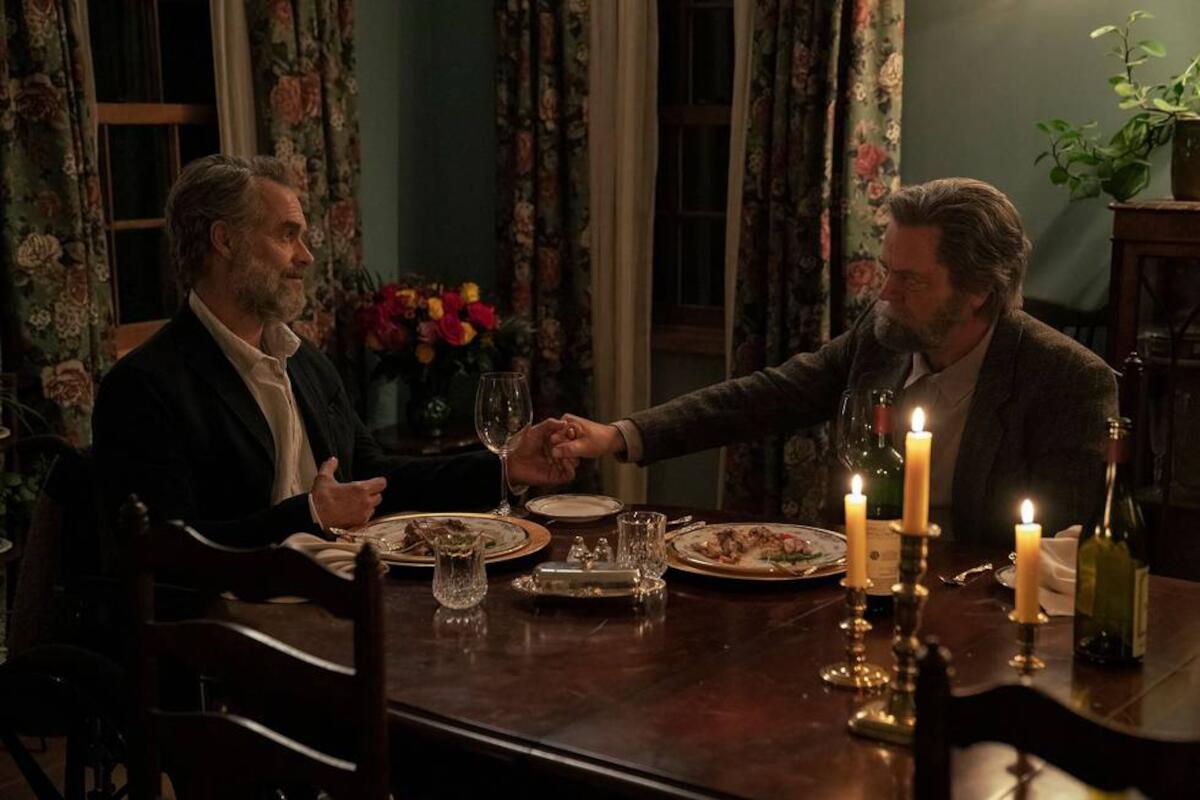
But Offerman turns serious when asked, as a straight man, if he had concerns about playing a gay character — albeit, a closeted, sexually inexperienced one — at a time of more sensitivity to representation onscreen.
“I think Bill was concealing a terror because this has never happened to him before,” he says. “So for me, my bulletproof vest was, ‘My terror is real. I know I can play all these scenes — I can dig these holes, I can skin this deer — but I’ve never done what’s going to happen between Frank and Bill.’ I was able to lean on that — it feels like an intoxication [between the characters] that happens despite myself, or despite any preconceived notions.” Looking around the virtual room, he adds, “I also just felt protected by the brains and the hearts assembled here.”
Amid the action and horror of “The Last of Us,” “Long, Long Time” serves as a brief, tranquil oasis, with Hoar and his actors ensuring that the episode’s emotional effect flowed from the restrained performances.
“It was more about letting things happen and making them feel real,” Hoar says. “There were moments where I was looking at my cinematographer, Eben [Bolter]: There’s hundreds and hundreds of people [around], and yet we have one camera on two men eating strawberries with the sun going down. I’m like, ‘This is a Sundance movie. This is not a typical thriller-horror.’ I had to pinch myself a number of times because it was so beautiful.”
It’s been well-documented that Mazin cried multiple times during the filming and postproduction of “Long, Long Time,” deeply affected by what his actors brought to this melancholy romance. But he wasn’t alone: During our interview, Bartlett gets choked up discussing Bill and Frank’s final scene. “God, it just makes me emotional thinking about it,” Bartlett says. “This is what we all did the whole time — we couldn’t talk about [that final scene] without getting emotional.”
Taking liberties with Druckmann’s original conception of Bill and Frank, Mazin knew he might anger gamers. But he always conceived the episode with its current ending, in which the lovers decide to die together, content with the rich life they’ve shared. For Mazin, who is also straight, it stemmed from the responsibility he felt to get this gay love story right — and to avoid regressive tropes from previous depictions of LGBTQ relationships.
“For years, gay characters would die to teach a straight person a lesson or make them feel something,” Mazin says. “There was always tragedy attached to queerness. On the other hand, drama is tragic — and in a show like ours, everyone’s dying all the time. But [I wanted] to make sure that Bill was reassuring Frank and us: ‘This is our choice. This is what we want. This isn’t tragic.’ They get the only happy ending in the entire show, as far as I’m concerned.”
Hearing that, Bartlett is moved to respond. “I’d never thought of it that way,” he says. “It didn’t feel like we were hurtling toward a happy ending, because it feels more honest than that. The story feels like a lived-in, real relationship to me. Every time we did that [final] scene, it was this beautiful surprise. Frank is livid at [Bill] for [deciding to die as well], but also it’s the most romantic thing — and it doesn’t occur to him, I think, until that last moment that ‘Of course, this is the end that we were meant to have.’ But Frank doesn’t see it coming — and I don’t think the audience sees it coming either, which is what makes it so beautiful. That’s what life is — you don’t see it coming.”
More to Read
From the Oscars to the Emmys.
Get the Envelope newsletter for exclusive awards season coverage, behind-the-scenes stories from the Envelope podcast and columnist Glenn Whipp’s must-read analysis.
You may occasionally receive promotional content from the Los Angeles Times.
